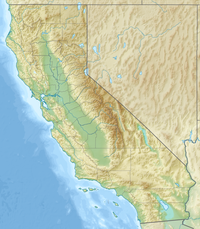Cardinal Mountain
| Cardinal Mountain | |
|---|---|
 South aspect from Taboose Pass | |
| Highest point | |
| Elevation | 13,402 ft (4,085 m) NAVD 88[1] |
| Prominence | 568 ft (173 m)[1] |
| Parent peak | Split Mountain - South Peak[1] |
| Isolation | 1.14 mi (1.83 km)[1] |
| Listing |
|
| Coordinates | 36°59′58″N 118°24′46″W / 36.9994047°N 118.4127374°W[4] |
| Naming | |
| Etymology | Cardinal (color) |
| Geography | |
| Location | |
| Parent range | Sierra Nevada |
| Topo map | USGS Mount Pinchot |
| Geology | |
| Rock type | metamorphic over granitic |
| Climbing | |
| First ascent | 1922 |
| Easiest route | Simple scramble class 2[5] |
Cardinal Mountain is a 13,396-foot-elevation (4,083 meter) mountain summit located on the crest of the Sierra Nevada mountain range in northern California.[4] It is situated on the common border of Fresno County with Inyo County, as well as the shared boundary of John Muir Wilderness and Kings Canyon National Park. It is 14 miles (23 km) south-southwest of the community of Big Pine, approximately one mile north of Taboose Pass, and one mile south-southeast of Split Mountain, which is the nearest higher neighbor. Cardinal Mountain ranks as the 73rd highest summit in California.[6] The first ascent of the summit was made August 11, 1922, by George Downing, Jr.[7] The standard approach is via the Taboose Pass Trail, and the John Muir Trail passes west of this peak, providing an approach option to the mountain. The mountain's descriptive name was given by George R. Davis, a USGS topographer, on account of the brilliant red color of the roof pendant, like the red cap of a cardinal.[8]
Climate
[edit]According to the Köppen climate classification system, Cardinal Mountain has an alpine climate.[9] Most weather fronts originate in the Pacific Ocean, and travel east toward the Sierra Nevada mountains. As fronts approach, they are forced upward by the peaks, causing them to drop their moisture in the form of rain or snowfall onto the range (orographic lift). Precipitation runoff from this mountain drains west into the South Fork Kings River, and east to the Owens Valley via Red Mountain and Taboose Creeks.
See also
[edit]Gallery
[edit]References
[edit]- ^ a b c d "Cardinal Mountain, California". Peakbagger.com. Retrieved 2021-05-26.
- ^ "Sierra Peaks Section List" (PDF). Angeles Chapter, Sierra Club. Retrieved 2021-10-06.
- ^ "Vagmarken Sierra Crest List". Angeles Chapter, Sierra Club. Retrieved 2021-11-06.
- ^ a b "Cardinal Mountain". Geographic Names Information System. United States Geological Survey, United States Department of the Interior. Retrieved 2021-05-26.
- ^ Secor, R.J. (1992). The High Sierra Peaks, Passes, and Trails (1st ed.). Seattle: The Mountaineers. p. 172. ISBN 978-0898863130.
- ^ "Cardinal Mountain CA". ListsOfJohn.com. Retrieved 2021-11-06.
- ^ Fred L. Jones, A Climber’s Guide to the High Sierra (1954)
- ^ Francis P. Farquhar, Place Names of the High Sierra (1926)
- ^ Peel, M. C.; Finlayson, B. L.; McMahon, T. A. (2007). "Updated world map of the Köppen−Geiger climate classification". Hydrol. Earth Syst. Sci. 11. ISSN 1027-5606.
External links
[edit]- Weather forecast: Cardinal Mountain
- Geology of the Split Mountain/Cardinal Mountain area: Geoscienceworld.org
- Cardinal (left) and Split Mountains, aerial photo from east: Flickr






